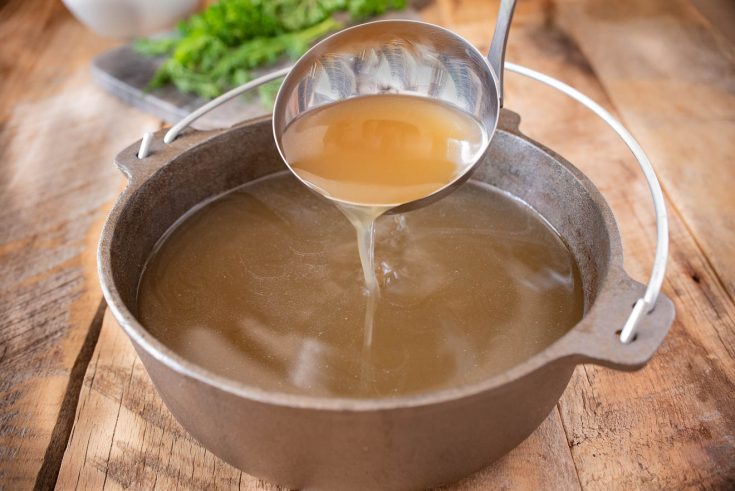The Ultimate Handbook to nutrient-rich feeding with bone broth for infants
The Ultimate Handbook to nutrient-rich feeding with bone broth for infants
Blog Article
The aSignificance of Healthy Food: Why Bone Broth Is a Great Selection for Infants
When it concerns your baby's nutrition, every selection issues. Bone broth sticks out as a nutrient-dense alternative, using necessary vitamins and minerals that support growth and growth. Its rich composition not only help food digestion yet additionally increases the immune system. Understanding exactly how to incorporate this flexible food into your child's diet plan can establish the phase for healthy consuming practices. So, what are the most effective means to present bone broth to your little one?
Nutritional Advantages of Bone Broth for Infants
When you introduce bone broth to your baby's diet regimen, you're giving a nutrient-dense food that provides many health and wellness advantages. Loaded with necessary minerals and vitamins, bone broth contains calcium, magnesium, and phosphorus, which sustain your infant's growing bones. It's likewise abundant in collagen, assisting in the growth of healthy and balanced skin, joints, and connective tissues.
Furthermore, bone broth is an outstanding source of amino acids like glycine and proline, which play a substantial duty in general growth and muscular tissue growth. These nutrients assist promote a solid body immune system, setting a strong foundation for your infant's health.
Furthermore, bone broth is easy to absorb, making it a mild choice for your child. By including this wholesome food into their dishes, you're ensuring they receive crucial nutrients necessary for their total health. So, go in advance and make bone broth a staple in your baby's diet regimen!
How Bone Broth Supports Digestion
Bone broth is packed with vital nutrients that can truly profit your infant's food digestion. It advertises digestive tract health and wellness and aids with nutrient absorption, making it a terrific enhancement to their diet regimen. By integrating bone broth, you're establishing the stage for a healthier digestive system.
Nutrient-Rich Make-up
One of the most nutrient-rich foods you can present to your baby's diet plan is bone broth, which is packed with crucial minerals and amino acids that support healthy and balanced digestion. Rich in collagen, bone broth assists strengthen your infant's intestine lining, making it simpler for their body to take in nutrients. It gives gelatin, which helps in damaging down healthy proteins, promoting smoother digestion. In addition, the broth includes necessary electrolytes like potassium and magnesium, ensuring your infant remains hydrated and balanced. The amino acids, such as glycine and proline, play a crucial duty out of commission cells and supporting overall health (organic bone broth). By incorporating bone broth into your baby's meals, you're giving them a wholesome food that supports their digestion system effectively.
Promotes Intestine Wellness
As you present bone broth right into your infant's diet, you'll discover it not just nurtures yet likewise promotes digestive tract wellness properly. Rich in jelly, bone broth assists relieve the gastrointestinal tract, lowering swelling and sustaining a healthy and balanced intestine lining. This is vital for infants, as a balanced intestine setting lays the foundation for total health. Additionally, the amino acids located in bone broth, such as glycine, aid in food digestion and can help stop common belly difficulties. By incorporating this beneficial liquid, you're giving your infant with essential nutrients that add to a growing gastrointestinal system. Inevitably, a healthy intestine can influence whatever from resistance to mood, making bone broth an outstanding selection for your child.
Aids Nutrient Absorption
Presenting bone broth not only sustains digestive tract health and wellness yet additionally plays a substantial role in assisting vitamins and mineral absorption. When you give your baby bone broth, you're supplying an abundant resource of minerals and amino acids that enhance their gastrointestinal processes. The jelly in bone broth aids to soothe the intestine cellular lining, boosting its capability to take in essential nutrients.
Strengthening the Body Immune System With Bone Broth

In addition, bone broth consists of glycosaminoglycans, like glucosamine, that can improve the immune system's capacity to function properly. This suggests it not just aids in constructing defenses yet also help in recuperation from health problems. By including bone broth right into your child's diet plan, you're supplying a natural source of nourishment that advertises wellness. So, consider making bone broth a staple in your baby's meals, as it can play an essential function in their immune health and advancement.
Easy Ways to Integrate Bone Broth Into Child's Diet
Integrating bone broth into your baby's diet can be basic and satisfying. You can also utilize bone broth as a base for soups or stews that you prepare for the family members, guaranteeing your child gets a taste of scrumptious, healthy dishes.
An additional alternative is to serve bone broth on its own. Cozy it up and provide it in a sippy cup or little dish-- it's a terrific way to present new flavors. If your child delights in grains, take into consideration cooking rice or quinoa in bone broth as opposed to water for additional sustenance. Finally, you can freeze bone broth in ice cube trays, making it easy to add a cube to various dishes whenever you want. These methods will aid your baby profit of bone broth effortlessly!
Homemade vs. Store-Bought Bone Broth: What to Pick
Which is far better for your child: homemade or store-bought bone broth? Self-made bone broth provides you total control over the components. You can select high-quality bones, organic veggies, and herbs, ensuring your child obtains one of the most nutrients without ingredients or chemicals. And also, making it in your home can be a fulfilling experience, permitting you to bond with your child while preparing wholesome food.
On the other hand, store-bought options are convenient and save you time. However, they often contain chemicals and might not match the deepness of taste and nutrition you get from homemade broth. If you select store-bought, look for brand names that are natural and without additives.
Ultimately, if you have the moment and resources, homemade bone broth is the remarkable option for your infant's health. If you're short on schedule, choose a top quality store-bought choice as check my site a back-up.
Age-Appropriate Bone Broth Offering Tips
As your child grows, it's crucial to customize bone broth serving pointers to their developing stage. For infants around 6 months, begin with a couple of spoonfuls of watered down bone broth (bone broth for pregnancy).
By the time your little one is around a year old, take into consideration providing bone broth as a standalone drink or blending it right into soups and stews. Simply make sure to maintain the broth reduced in salt.
Other Healthy Foods to Combine With Bone Broth for Infants
When you're wanting to improve the nutritional worth of bone broth for your infant, think about combining it with nutrient-dense veggies like carrots and spinach. Entire grain alternatives, such as quinoa or brown rice, can also add texture and fiber. Additionally, integrating healthy and balanced protein resources like shredded chicken or lentils will certainly complete the meal nicely.

Nutrient-Dense Vegetables
Nutrient-dense veggies are a great addition to bone broth for infants, boosting both taste and nourishment. Integrating veggies like carrots, spinach, and wonderful potatoes can improve the minerals and vitamin content of your broth. Carrots give beta-carotene for healthy and balanced vision, while spinach is loaded with iron and calcium, necessary for development. Wonderful potatoes include all-natural sweet taste and are abundant in fiber, aiding digestion.
You can easily blend these veggies right into the broth or offer them as soft, cooked pieces alongside it. This not just presents brand-new tastes however likewise urges your child to take pleasure in a selection of nutrients. By matching nutrient-dense vegetables with bone broth, you're laying the structure for a healthy and balanced diet regimen right from the beginning.
Entire Grain Options

Healthy And Balanced Healthy Protein Resources
Bone broth sets splendidly with different healthy and balanced protein resources, further improving your infant's diet regimen. Eggs, when introduced safely, are another great choice; they're versatile and packed with nutrients. By combining these healthy and balanced protein sources with bone broth, you're offering your infant a balanced, beneficial dish that supports their growth and growth.
Often Asked Inquiries
Can Bone Broth Reason Allergies in Newborns?
Yes, bone broth can trigger sensitive responses in infants, specifically if they're sensitive to particular active ingredients. Constantly consult your pediatrician before introducing new foods and screen for any indicators of allergic reactions after feeding.
Exactly How Should Bone Broth Be Kept for Infants?
You must save bone broth in closed containers, either in the fridge for as much as a week or in the freezer for up to three months. bone broth for infants. Constantly thaw it properly before serving to your infant
Is It Safe to Offer Bone Broth to Premature Babies?
It's necessary to consult your pediatrician before introducing bone broth to early infants. They'll examine your child's particular wellness needs and assure it's safe, considering their distinct nutritional needs and developmental stage. Always focus on expert recommendations.
What Are the Indications of Intolerance to Bone Broth in Children?
When presenting bone broth, expect indications like fussiness, rash, looseness of the bowels, or throwing up. If your baby shows any of these reactions, it's best to speak with a doctor prior to remaining to use it.
Can Bone Broth Be Utilized as a Dish Replacement for Newborns?
No, you should not make use of bone broth as a dish substitute for babies. It does not have crucial nutrients needed for their development. Rather, include it right into look at this website their diet plan together with balanced meals for added nutrition and flavor.
Report this page